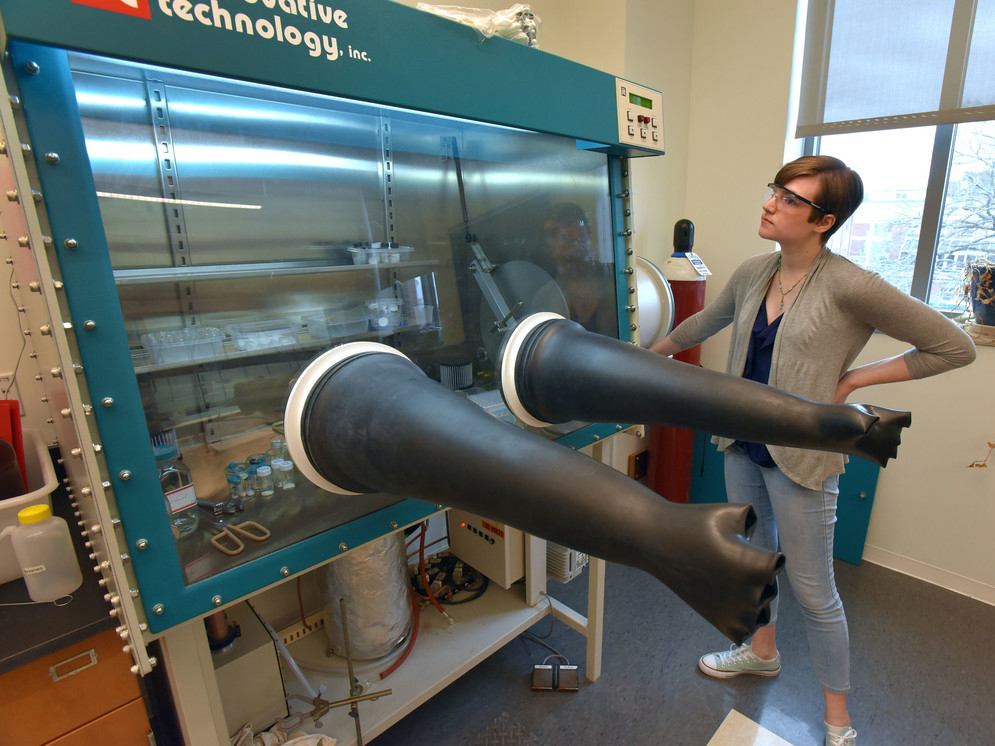Designing drugs

Amanda Swanson ’19 explores ways to counteract hypertension in chemistry lab
Hometown: Glastonbury, Conn.
Major: Biochemistry
Winternship: Wheaton College (independent research)
Funding source: Blakely Fetridge Bundy ’66 Work and Learning Fellowship
Researching hypertension: “My research project seeks to alter a known ACE [angiotensin-converting enzyme] inhibitor to improve its ability to counteract the potentially life-threatening effects of hypertension. This research is part of the honors thesis that I began last semester and will be concluding at the end of the spring 2019 semester.”
Reacting well: “Over winter break, my primary research goals were to complete synthesis of the modified amino acids and begin incorporating them into peptides [a compound consisting of two or more amino acids linked in a chain]. This involved a lot of research into methods that we could use for synthesis as well as a lot of time at the lab bench running reactions and collecting data.”
Putting science into words: “My hardest challenge was writing my thesis, because the lab challenges I encountered were more inside my comfort zone and fun for me to solve, whereas the writing challenges were newer and intimidating. I found the writing intimidating because thesis papers are very long in contrast to what I have written before, so thinking about the full project ahead of me was disconcerting, making it easier to ignore the paper than to write it. I wish I had an exciting or glamorous solution to this problem but, in reality, my solution was one that I have been taught since elementary school. This solution was simply to dedicate two hours every night to sit down and write, forcing me to start my paper since my other option was staring blankly at a word document for two hours.”
Mastering technology: “Certain aspects of research can sometimes feel redundant because studies and reactions have to be repeatable in order to be useful, but this means that learning how to use a new machine or figuring out a new reaction can be particularly exciting in contrast. For this reason, my favorite moment on the job was probably learning how to use the High Performance Liquid Chromatography—a machine that helps you determine if your molecule is chiral or not. In other words, it helps you to narrow down the orientation of specific atoms within your molecule, if there are two asymmetric versions of the molecule in your sample or just one. This is very important in pharmaceutical design and other healthcare fields of research, and is therefore of particular interest to me.”
A career in medicine: “After graduation, I intend to spend two years in a laboratory conducting research, hopefully connected to health and medicine before going to medical school. For this reason, my honors thesis connects very well with my future goals as it provides me with experience designing and testing a modified drug that could potentially have an effect on hypertension.”
Amanda is a May Fellow, the president of the Wheaton American Chemical Society, preceptor, Admission ambassador and organic chemistry course assistant. On campus, she works as a student animal caretaker and chemistry research associate. She also is a show member of the equestrian team. She spent two summers at the National Student Leadership Conference: first in Berkeley, Calif., as an assistant team advisor, and then as a team advisor in Chicago. In addition, she was a visitor education intern at the New England Aquarium and held a research internship at a lab in Auckland, New Zealand.
